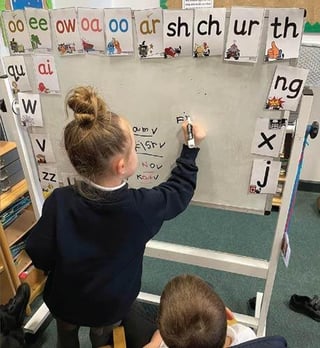Case Studies / Barrow Island Community Primary School
Barrow Island Community Primary School
How long-term baseline assessment data can help Reception pupils realise their full potential
About the school
Barrow Island Community Primary School is a state-funded school for 2-11-year-olds in Barrow-in-Furness, Cumbria, UK.
Former Headteacher Janet Dixon has been using Cambridge Insight (formerly CEM) baseline assessments for over 15 years both at Barrow Island and previously in schools in Lancashire.
Because it’s a standardised score, we can use that data long-term throughout their time at our school. "

Speeding up that getting-to-know-you time
Barrow Island are using ASPECTS and BASE assessments for their Nursery and Reception pupils, giving them a clear understanding of what their students already know and where there are opportunities for development when they join the school. Janet implemented a Reception baseline assessment when she joined Barrow Island.
The start of Reception can be busy and slightly overwhelming - for teachers as well as pupils. “Using the BASE assessment quickly tells us about so much about the children,” said Janet.
“The Reception teacher believes that the time she spends working one-to-one with the children, early in the term, enables her to efficiently assess the children’s knowledge and understanding while spending quality time with them.”
When a pupil was prompted by the assessment to find half of the ice creams on the screen, Janet observed how the child covered up half of the screen and then counted the two that were left. “That tells you so much about that child,” said Janet. “If you take it holistically and look at the wider aspect, the baseline assessments are a really useful tool for getting to know your children. It tells us things that may not have been seen for a long time when observing children.”
Using data-driven insights for predictions and interventions
“I believe that data used properly can help ensure that children who need interventions are identified early,” said Janet. “Historically, I was very sceptical about data because the assessment provided predictions as to where the children would be by the end of Key Stage 1 and Key Stage 2. But over time, I realised that those were actually a very accurate way of predicting what the children would achieve, or if the children needed an intervention.”
Now that Key Stage 1 SATs are optional, the only measure of student ability for Reception is the government’s Reception baseline assessment (RBA).
“We especially like BASE because we feel it gives you more information than the RBA,” Janet explained. “The RBA is really limited in what it tells you. It’s a narrative.”
In a study of 70,000 BASE assessment results across England, we learnt more about what children typically know and can do at the start of Reception. Read this blog post about "what do four year olds know" to find out more.
The long-term effects of analysing assessment data
Janet shares the assessment data with both teachers and governors and assesses pupils throughout their time at Barrow Island. “Because it’s a standardised score, we can use that data long-term throughout their time at our school,” said Janet.
“Baseline assessments help us understand where the children are starting from when they join us. The standardised scores at the beginning of Reception give us another tool to identify if a child needs support. It gives you further evidence to back up observations.”
Measuring individual pupil data doesn’t just have positive effects for the pupil but can reveal trends over time that make it easier to provide support for future cohorts. “Analysing historical data enables you to improve outcomes for other cohorts of children,” said Janet. “We use it to identify what we are going to put in place early on in our practise to make sure that we address those areas that we’ve identified historically as challenges for our children.”

Find out more about how Cambridge Insight assessments for Early Years can help support the development of your Reception pupils
Early Years Assessments

